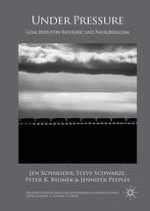2016 | OriginalPaper | Buchkapitel
4. The Technological Shell Game
verfasst von : Jen Schneider, Steve Schwarze, Peter K. Bsumek, Jennifer Peeples
Erschienen in: Under Pressure
Verlag: Palgrave Macmillan UK
Aktivieren Sie unsere intelligente Suche, um passende Fachinhalte oder Patente zu finden.
Wählen Sie Textabschnitte aus um mit Künstlicher Intelligenz passenden Patente zu finden. powered by
Markieren Sie Textabschnitte, um KI-gestützt weitere passende Inhalte zu finden. powered by
